What Kind of Patio Furniture is Most Durable?

As you begin to uncover the patio furniture and take the cushions out from storage, you may be frustrated to find that last season’s furnishings no longer look to be in guest-ready shape. If you find yourself in this situation, you may be asking, “How do I choose outdoor furniture that will last? What kind of patio furniture is the most durable? What materials work best for where I live?”
Let’s explore some of the most durable outdoor furniture and upholstery materials!
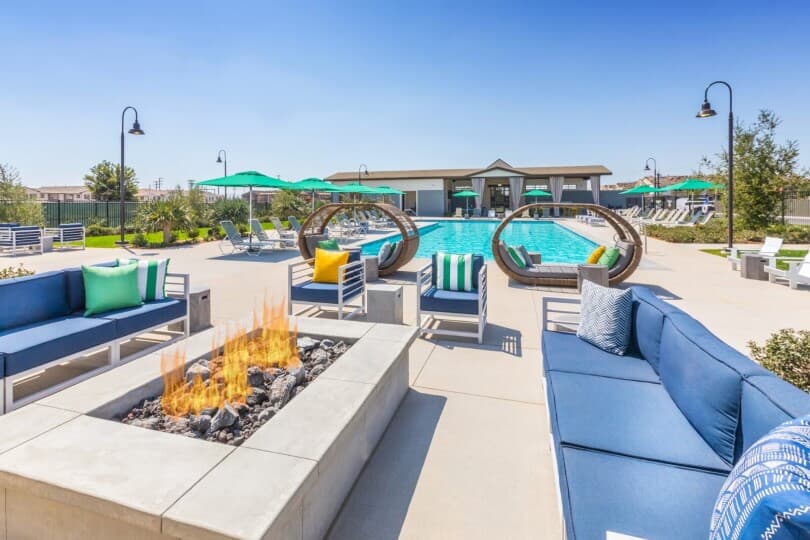
Consider Your Climate
The main culprit of your outdoor furniture’s wear and tear is exposure to the elements. Water can cause mold or warping, the sun can cause fading and cracking, and wind can blow away that lightweight deck chair.
Before you make any purchases, make a note of the environment it will be in. Porous materials, such as wood, aren’t the best choice for areas that have a lot of humidity or rain. Painted pieces won’t last in sunny locations where paint can peel or crack. Delicate materials like wicker are better suited in protected spaces, like a screened-in or covered porch.
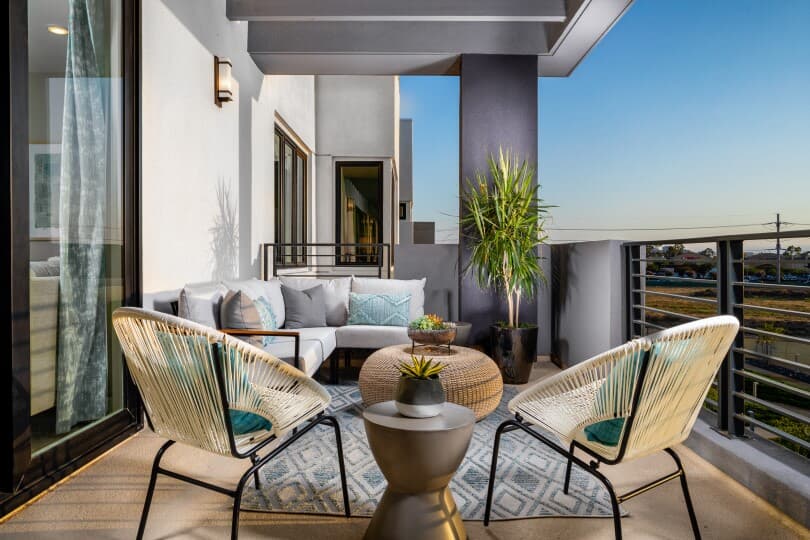
Popular Outdoor Furniture Materials
Each material has its own strengths and weaknesses. Depending on your area’s climate, your intended use, and even your personal style, there’s an outdoor furniture material perfect for you.
Wood
As a natural material, wood is a great choice for a comfortable feeling in your outdoor space. It has an ageless beauty that can be enjoyed for a long time. However, wood requires refinishing and maintenance a minimum of every two years to preserve its color and protective finish. Pine, cedar, or fir are softer woods with some degree of natural weather resistance.
Teak
Many experts agree that teak is the best choice if you want to use wood outdoors. It’s incredibly strong and doesn’t warp; repels most water; resistant to damage from rot, decay, or insects; and has an attractive color you can maintain with minimal oiling or can patina into an attractive silver-gray over time.
Wrought Iron
Truly an investment that keeps on giving, wrought iron is one of the most durable and longest lasting types of outdoor furniture available. Though durable, it needs protection from rust, and its weight makes it difficult to move – though this is great for a windier environment.
Aluminum
Aluminum is the most common type of outdoor furniture frame material. It’s lightweight, strong, durable, and can be worked into a wide variety of designs. Aluminum patio furniture is relatively inexpensive, low maintenance, and never rusts.
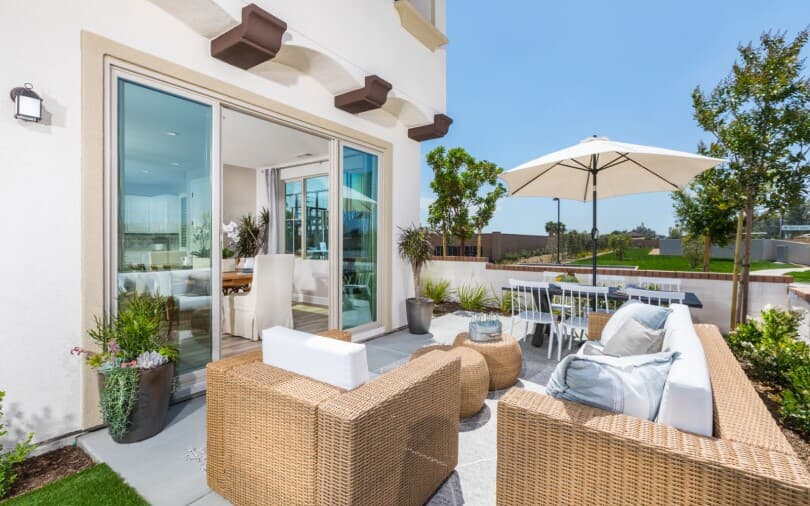
Wicker: Synthetic Resin a.k.a All-Weather Wicker
Virtually all outdoor wicker furniture is made from synthetic resin. Natural wicker is made from a variety of organic sources, and while aesthetically pleasing, it’s much more susceptible to damage from rain, moisture, and humidity. High-quality resin is very dense, resistant to weather damage, and eco-friendly. All-weather wicker is strong, lightweight, fade-resistant, and easy to clean.
Stainless Steel
Stainless steel offers a modern style to any outdoor space. It’s resistant to corrosion and oxidation making it incredibly durable. It’s a great material option for large weight-bearing outdoor dining tables, sofas, and sectionals. Just be sure to have cushions as it does get hot to the touch. Its weight ensures your pieces will not tip over or blow away in windy conditions. Though it can be expensive, it’s easy to clean, often made using recycled materials, and gives your space a chic contemporary look.
Recycled Plastic
In both style and performance, recycled plastic patio furniture ranks at or near the top. An eco-friendly option for outdoor furniture, it is extraordinarily strong, durable, and resistant to moisture, mildew, insects, and saltwater. It’s resistant to fading and since it is often made to resemble wood, you have a high end look without the care that wood needs. While it doesn’t require much maintenance, its lightweight nature makes it susceptible to high winds.
High-Pressure Laminate (HPL)
High-pressure laminate has a sleek look and is extremely hard, helping it resist stains and scratches. Melamine can be added to increase its durability. It’s flame retardant and has antibacterial properties. HPL has a sleek look that instantly elevates an outdoor space, but this comes at a higher price tag than other materials.
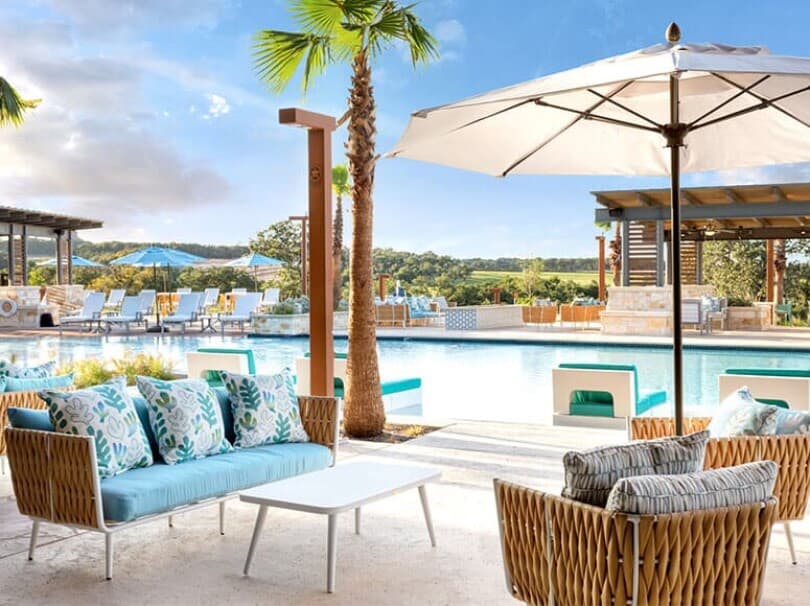
Popular Outdoor Upholstery Materials
Just as they do indoors, pieces such as cushions and accent pillows make your outdoor furniture more stylish and comfortable to use. Outdoor upholstery needs to retain structural integrity and appearance over many seasons and in various weather conditions.
Polypropylene
One of the first marine fabrics due to its superior UV resistance and quick drying ability, polypropylene is often considered one of the best for outdoor use. Polypropylene is made with a tighter weave and heavier finishing process making it stiffer and built to endure rough weather and outdoor conditions.
Acrylic
Acrylic fabric is the best all-purpose textile as it is often used for cushions, pillows, and patio umbrellas. Its mold- and mildew-resistant, can hold up to rubbing or tearing, holds its color longer, and is easy to clean.
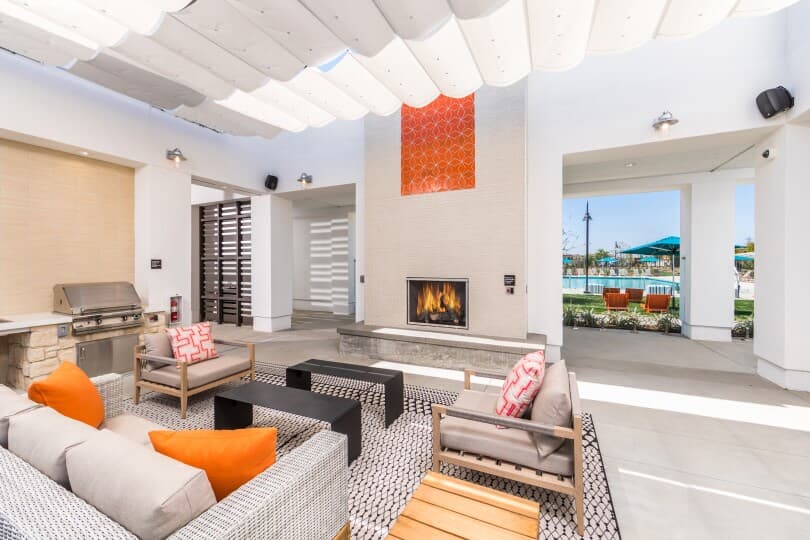
Cotton Blend
Cotton blend fabrics work best if you’re looking for a material that’s softer to the touch. Although not naturally water or fade resistant, many cotton blend fabrics come with finishes that strengthen them against the sun’s rays and water damage. This added protection makes them more resistant to mildew and color fading than their natural counterparts.
Polyester
Polyester resists tearing and water damage, but is prone to fading. This material works best in shaded spaces to increase longevity. It’s quick-drying, and comes in bold colors and patterns.
Vinyl
Vinyl is one of the most durable options for outdoor upholstery. It has a plastic-like feel which makes it more suitable for seats, back slings, screens, and umbrellas. The material isn’t as breathable compared to other options so it may not be as comfortable in hot weather.
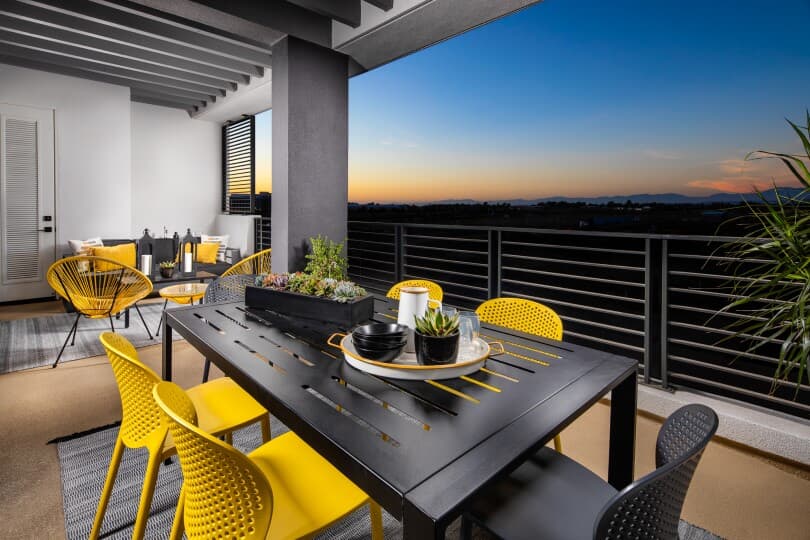
Care and Maintenance for Outdoor Furniture
Even the most durable outdoor furniture and upholstery needs to be cared for. The usable life of these pieces can be extended by keeping it clean and maintained both during and after the summer months.
- Read your furniture and upholstery’s specific care instructions
- Use gentle cleansers and soaps
- Avoid harsh treatments such as chlorine, bleach, and abrasive cleaners
- Prevent and manage mold and mildew
- Properly store outdoor furniture when not in use
- Make use of outdoor furniture coverings
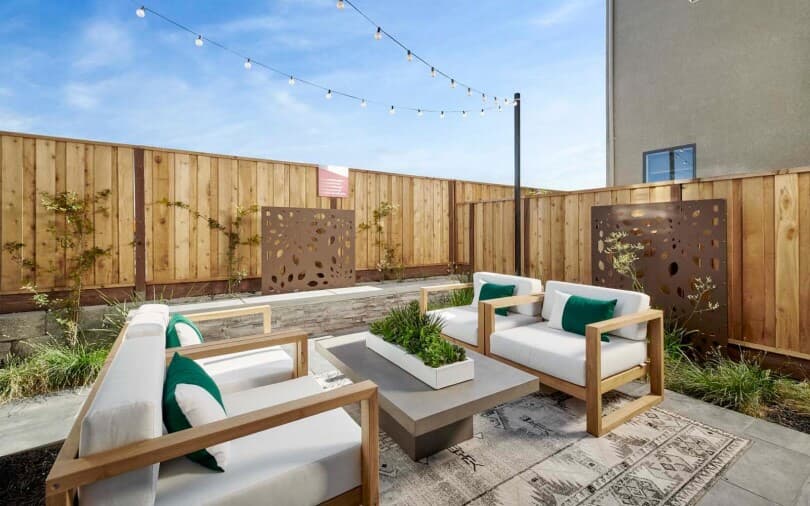
Outdoor living spaces, like their indoor counterparts, are worth investing in. Take the time to understand your area’s climate, different furniture materials, and upholstery options so you can enjoy the comfort and beauty of your outdoor space for many seasons to come.
Be sure to follow the Brookfield Residential blog for more design advice, homebuying insights, mortgage tips, and more. Explore where we build and connect with our sales team when you’re ready to learn more. We’ll be expecting you!
